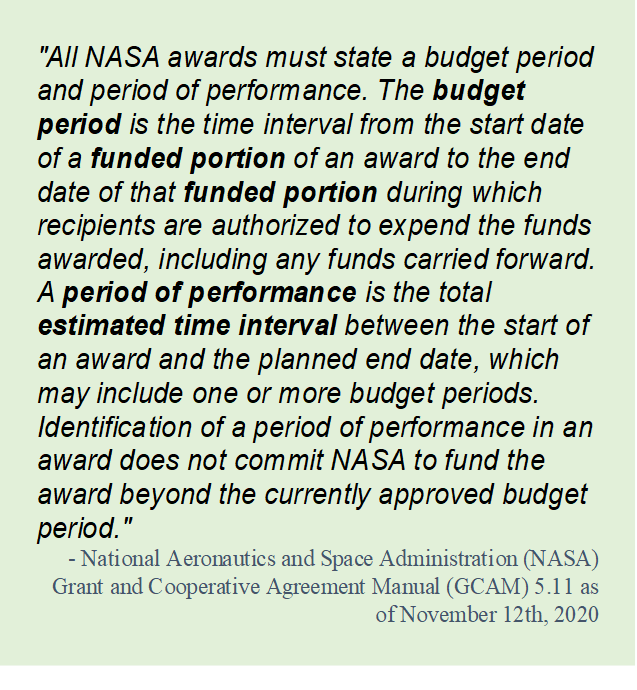
Most sponsored agreements specify a time period during which the sponsor expects the awardee to complete all award activities and incur and expend funds – known as the Period of Performance (POP). The overall award start and end dates indicate the POP, for example, a 5-year POP expressed as 10/01/2021 to 9/30/2026. Spending outside of these dates is generally unallowable.*

In addition to the POP, some sponsors indicate specific time intervals for authorized spending. These intervals are generally known as the Budget Period. Budget periods are typically 12 months in duration but may be shorter or longer. For example, an award with a POP of 10/01/2021 to 9/30/2026 may be divided into 5 budget periods beginning with 10/01/2021 – 09/30/2022 (see Figure 1). When a budget period is specified, CSU can only charge costs resulting from obligations incurred during the budget period. Sponsors often state, “expending funds outside the authorized period are the responsibility of the award recipient.” This means if the sponsoring agency does not award/authorize an anticipated year/option/task order, and the Principal Investigator continues spending, all expenses past the authorized budget period may have to be covered by the recipient/Institution.
Uniform Guidance produces an important distinction in 2 CFR 200.1 Definitions: “period of performance means the total estimated time interval between the start of an initial Federal award and the planned end date, which may include one or more funded portions, or budget periods. Identification of the period of performance in the Federal award per § 200.211(b)(5) does not commit the awarding agency to fund the award beyond the currently approved budget period.”

If authorized via sponsor prior approval, unobligated (aka unspent) balances and expenses can carryover for a subsequent budget period. It is important to understand the distinction between the Period of Performance, budget periods, and if the award allows for carryover in order to spend appropriately on an award. Always check your sponsored agreement for prior approval options. Other useful prior approvals related to managing time periods include the Carryover, No Cost Extension, and the At-Risk Spending requests. In the coming weeks, look forward to the release of the new No Cost Extension form!
*Some sponsored programs allow for pre-award spending. (Check out the Pre-Spending blog)
Blog post by Kathryn O’Hayre, Training & Information Coordinator, Office of Sponsored Programs